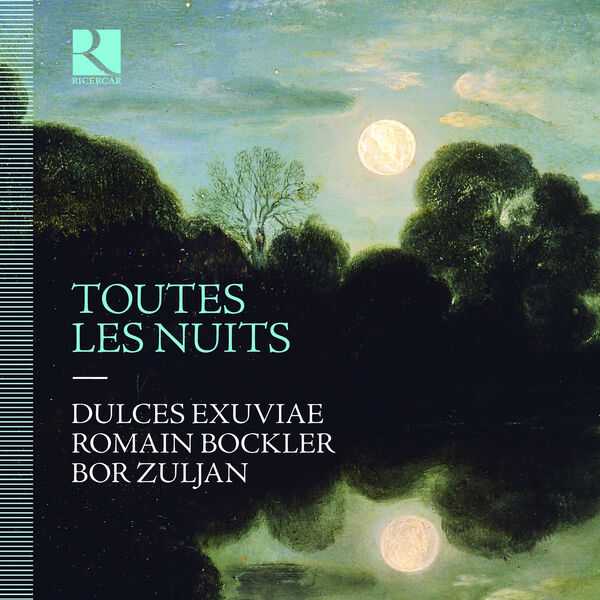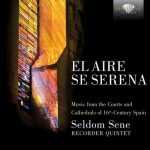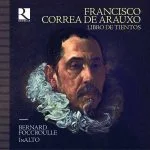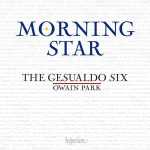

Performer: Romain Bockler, Bor Zuljan, Dulces Exuviae
Format: FLAC (tracks)
Label: Ricercar
Catalogue: RIC446
Release: 2023
Size: 2 GB
Recovery: +3%
Scan: yes
01. Verdelot: O dolce nocte
02. Tromboncino: Tu dormi
03. Guerrero: Si la noche haze escura
04. Paladin: Fantaisie I
05. anon.: Estas noches a tan largas
06. Pisador: Si la noche haze escura
07. anon.: La nocte quando
08. Palestrina: Che non fia che giamai dal cor si sgombri
09. Lassus: Toutes les Nuitz
10. Janequin: Toutes les nuictz
11. anon.: Toutes les nuycts
12. Crecquillon: Toutes les nuyctz
13. Paladin: Fantaisie II
14. Crecquillon: Si pour amans la lune est importune
15. Vasquez: Salga la luna
16. Palestrina: Deh, hor foss’io col vago della luna
17. anon.: Aý Luna
18. Paladin: Fantasia IV
19. Josquin: Et trop penser, NJE 27.9
20. Lassus: La nuit froide et sombre
21. anon.: Da poi nocte vien la luce
22. Paladin: Fantasia III
23. Manchicourt: Voiez le jour
24. anon.: Al alba venid
25. Lennon & McCartney: Blackbird
In nocte consilium – the night brings counsel. Poets have always found the night to be a time of appeasement; for astronomers it is a long-awaited moment to observe the stars and planets. Mystics, however, have spent entire nights searching for the enigmatic signs of a divine presence. This programme forms a journey from dusk to dawn and guides us through various nights as described by several composers of the 16th century: we travel from hope to absence, from the sweetness of love’s dream to the chills of eternal night; the clear light of the moon nonetheless guides lovers to their reunion and our journey ends in the light of the first rays of the sun. Janequin, Lassus, Palestrina, Guerrero and their Franco-Flemish, Italian and Spanish colleagues lead us as we explore these nights, sometimes dark and terrifying, sometimes radiant with starlight, tranquil, and filled with love.
The night was a common theme in Renaissance poetry, and various collections of chansons on nocturnal images exist. This one, however, is a standout. Baritone Romain Bockler and lutenist Bor Zuljan (they are Dulces Exuviae, although the graphics suggest a separate ensemble) divide their program into five parts: Twilight, Solitude, Dream, Moonlight, and Dawn. The minimal ensemble of one singer and one instrumentalist is enlivened by various factors, one being the high quality of the repertory involved; these songs are lovely. The duo focuses in on one particular text, the anonymous Toutes les nuits (spelled in a delightful variety of ways, with one instrumental setting), and these are ideal for appreciating how composers approached the poetry they used. The musicians’ techniques are also notable. Bockler adds a good deal of ornamentation that is quite varied from piece to piece, responding to the texts. Zuljan uses two different lutes, one of them with metal strings, for an entirely unusual effect. All these factors add variety that makes the program consistently interesting, enough so that the inclusion of a Beatles song, heavily accented, at the end was not really necessary. The sound from the Chapelle Notre-Dame de Centeilles is not really idiomatic but is clear enough. This is a Renaissance chanson release of great interest to both specialist and general listeners, and it landed on classical best-seller lists in early 2023.



